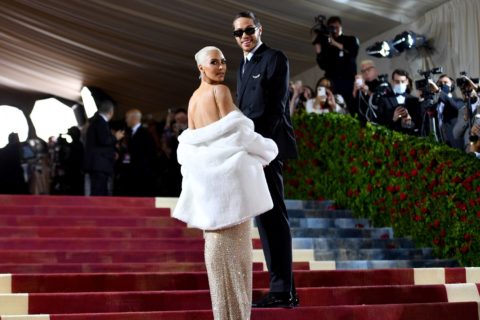Roe v. Wade Overshadows Gilded Glamour of the Met Gala
The 1800s are back and not in a good way.
Poor Anna Wintour. Not even her Chanel sunglasses could hide her from this mess.
After months of painstakingly perfecting the guest list and seating chart, marrying the right designer with the right star, curating on-theme place settings, floral arrangements and decor, and overseeing the actual exhibition, in the end, it didn’t matter. None of it did. All anyone will remember about last night’s Met Gala was the news that the Supreme Court may overturn Roe v. Wade, the landmark ruling that legalized abortion nationwide in America.
View this post on Instagram
If the news wasn’t so profoundly disturbing, the irony would be funny. And in a really dark sense of the word, it is. The theme of this year’s two-part exhibit at the Metropolitan Museum of Art was American fashion. First came September’s “In Americana: A Lexicon of Fashion,” and then last night we were introduced to “In America: An Anthology of Fashion,” with the dress code of “gilded glamour.” Where the first part had a more emotional tie-in, this new exhibit focuses on American fashion in the Gilded Age, a period from 1870 to 1890 that saw extreme industrialization, growth and, in some cases, prosperity.
When the theme was announced in April, it was already garnering criticism for evoking a “let them eat cake” mentality to a world clearly in crisis. This Twitter user perhaps says it best in the tweet.
Am I the only one who thinks this years #MetGala theme is out of touch? inequality is at the highest levels since the Gilded Age, a pandemic & economic meltdown wrecked us, inflation is out of control… but cool, let’s wear #GildedAge themed dresses & laugh about inequality
— Kelsea Marie Pym (@KelseaMariePym) April 30, 2022
Fast forward to the night of the gala, and digital outlet Politico leaked the news of the possible overturn of Roe v. Wade, and the parallels between the politics of the late 1800s and the 2020s were impossible to ignore. Wealth inequality? Kim Kardashian’s Marilyn Monroe dress literally cost $5 million and Amazon workers are fighting to make minimum wage so, check. A widespread pandemic that affects millions of people? Check. (Although the Spanish Flu was more prevalent in Europe, it still counts.) And then women fighting for basic human rights, such as the right to control their own body? Check.
But even before the 2020s began, the United States was having a major image problem. For a country that was once so proud of its sparkly “American dream” image, the shine turned to rust pretty quickly, as an orange-haired President put a spotlight on all of the deep-rooted problems that many people of privilege had turned a blind eye to. In the wake of the political aftermath, the world’s perception of “the land of the free” had fundamentally changed — and is not likely to ever recover.
So to have not one, but two Met Galas celebrating it, was a bold choice to say the least. But Anna Wintour has never been afraid of controversy — putting jeans on her first cover, inducting Kim and Kanye into the fashion world, cropping Lena Dunham’s larger-than-a-size-zero body off the cover, white-washing Kamala Harris and many more — and so I can’t say I’m surprised.

For the Met Gala to both survive and thrive, it needs to better tap into the zeitgeist. Fashion is a mirror of what’s happening in society and for good and bad, the Gilded Age, and by extension the theme, “gilded glamour” inadvertently proves that history does indeed repeat itself. But to specifically celebrate the wealthy patrons of this period is in bad taste. For every heiress (or Kim K), there were, and are, hundreds of workers trying to escape poverty, inequality and other hardships, which Riz Ahmed so beautifully paid tribute to at the event. Vogue and the Costume Institute at the Met might want to take notes from London, England’s Victoria & Albert Museum, who masterfully curated the new exhibit, Fashioning Masculinities: The Art of Menswear. The show both brilliantly brings to life and questions the once rigid lines of gender, and is unquestionably relevant in today’s society.
As we anxiously await more information on the overruling of Roe v. Wade, the future of both the Met Gala and women’s autonomy over their bodies is looking very fragile — in the U.S. and here in Canada, too.









